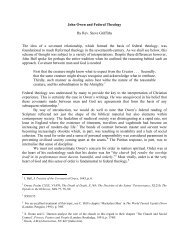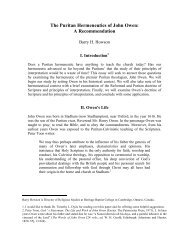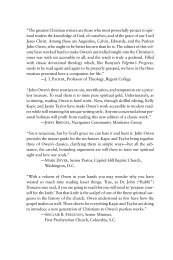M.TH. LONG DISSERTATION (LD6.1) - John Owen
M.TH. LONG DISSERTATION (LD6.1) - John Owen
M.TH. LONG DISSERTATION (LD6.1) - John Owen
You also want an ePaper? Increase the reach of your titles
YUMPU automatically turns print PDFs into web optimized ePapers that Google loves.
<strong>John</strong> <strong>Owen</strong>’s Theological Context<br />
the process losing Calvin’s Christ-centred, biblical approach; this accusation is levelled<br />
against <strong>Owen</strong> by Alan Clifford. 5 The second criticism comes from <strong>Owen</strong>’s great Puritan<br />
contemporary Richard Baxter. In 1649 Baxter accused <strong>Owen</strong> of teaching the doctrine of<br />
eternal justification, 6 whereby the elect are justified in Christ from eternity, not, as in the<br />
standard Reformed view, from the moment they believe in Christ. 7 Finally, Hans<br />
Boersma, in his discussion of <strong>Owen</strong>’s response to Baxter’s accusations, 8 accuses <strong>Owen</strong><br />
of expounding an incoherent ordo salutis, and in particular of failing adequately to account<br />
for the place and timing of union with Christ in relation to faith and to the imputation of<br />
Christ’s righteousness. In a review of Carl Trueman’s monograph on <strong>Owen</strong>, 9 Boersma<br />
repeats his accusation, and goes so far as to say that, ‘It is difficult to avoid the<br />
conclusion that with <strong>Owen</strong> history is in danger of being swallowed up by eternity.’ 10<br />
Through a careful exposition of <strong>Owen</strong>’s teaching on union with Christ and<br />
eternal justification, based on fresh research on a variety of sixteenth and seventeenth<br />
century primary texts, I shall examine whether or not these criticism are fair. I shall<br />
argue that <strong>Owen</strong> faithfully teaches the Reformed doctrine of justification, although the<br />
precise manner in which he does so is sensitive to theological developments among<br />
Reformed theologians in mid-seventeenth century England. However, before<br />
considering <strong>Owen</strong>’s position, it is important to outline the methodology that this<br />
dissertation will employ in seeking to understand his teaching.<br />
5 The classic statements are found in Hall 1966 and Armstrong 1969: 31-33. Their assumptions are<br />
uncritically picked up and repeated by McGrath in his discussion of Reformed Orthodox formulations of<br />
justification (1998: 227), and by Clifford in his assessment of <strong>Owen</strong> on justification (1990: 69f).<br />
6 On eternal justification, see chapter 2, below.<br />
7 Baxter 1649: II.146ff.<br />
8 Boersma 1993: 104-108.<br />
9 Trueman 1998a.<br />
10 Boersma 2001: 269.<br />
13





